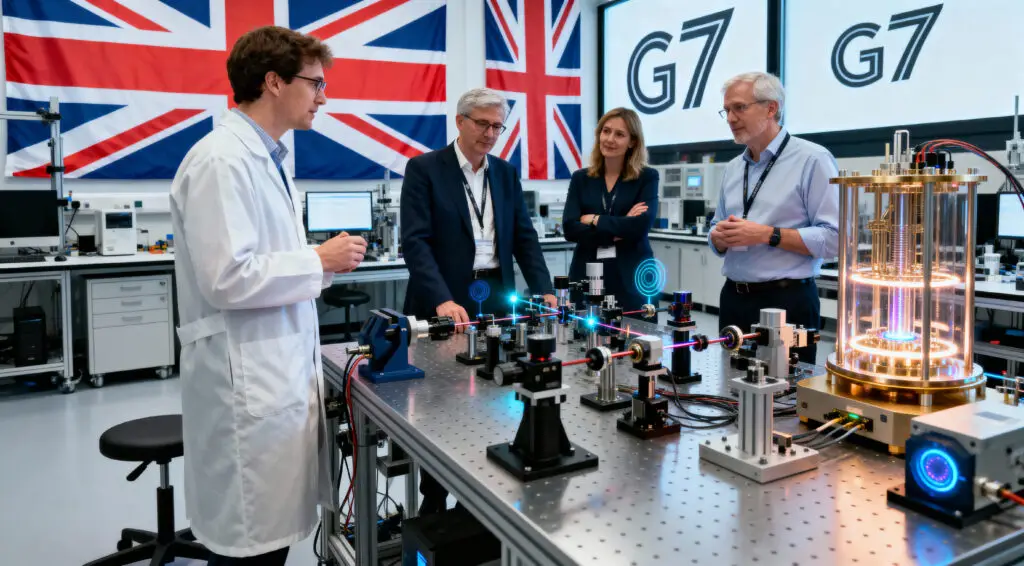The UK and G7 Nations Launch Global Quantum Technology Alliance
The UK has started a big international cooperation to speed up the growth and standardization of quantum technology. The NMI-Q agreement brings together G7 countries and Australia to encourage cooperation in the quickly growing fields of quantum computing and metrology.
The National Physical Laboratory (NPL) made the news on Monday. This is a big step toward the UK being a world leader in both quantum innovation and engineering life.

Source: LinkedIn
NMI-Q to Standardize Global Quantum Measurements
Under the NMI-Q framework, national metrology institutes from countries that are part of the program will work together to standardize measuring methods and create international standards for quantum technology. Metrology, the study of measurement, is very important for making sure that the new quantum sector is accurate, consistent, and able to work with other systems.
The UK and the US will co-chair the 1st term of the collaboration. This shows a commitment across the Atlantic to making quantum progress more consistent and setting common standards that can be used for research, testing, and commercial use.
Science Minister Vallance Supports Investment and Innovation
Science Minister Lord Vallance formally announced the agreement and launched the new Reference Biofoundry at NPL. This government-funded laboratory is meant to speed up progress in vaccinations, gene treatments, and synthetic biology.
Vallance remarked, “The UK is leading the way in the growth of engineering biology and quantum technologies.” “Our new, stateoftheart Reference Biofoundry and strong global partnerships will help bring innovators’ ideas to market faster, which will help our economy.”
Recommended Article: Shiprocket Moves Into Marketing Tech Before Planned IPO
Boosting Economic Growth Through Global Collaboration
Vallance said that the NMI-Q project will bring in private investment, encourage technological excellence, and make sure that innovation continues to meet public requirements. He stressed that it is important to have standardized measurement standards in order to scale up new quantum technologies in a responsible and effective way.
He went on to say, “We need projects like these to push for excellence and global standards that make sure technology keeps moving forward.” “From quantum medical scanners for hospitals to engineering biology that gives us new ways to recycle, innovation has to work for everyone.”
Advancing Quantum and Life Sciences in Tandem
The opening of the NMI-Q collaboration and the Reference Biofoundry shows how the UK is working to improve important scientific fields in a coordinated way. The government wants to expand its position as a major actor in global science and technology development by working together on quantum research and biological engineering.
Officials said that these kinds of partnerships not only promote technical independence, but they also stimulate the sharing of information, skills, and resources across national lines. This is necessary to stay ahead of the competition in a global market.
Setting the Bar for Future Technology Standards
Experts argue that the NMI-Q agreement will help set standards for how countries agree on quantum benchmarks, from calibrating gear to making sure data is safe. This will open the door to further uses in computing, health, and cybersecurity.
By leading this effort, the UK strengthens its goal of becoming a leader in both innovation infrastructure and international standards. This will make sure that new technologies are dependable, work with other technologies, and are useful in all fields.
The UK’s Continued Leadership in Innovation
The government is investing in places like the Reference Biofoundry and taking part in G7-led projects. This is part of a larger plan to make the UK a center for technical excellence. Officials claim that collaborations like NMI-Q help the UK stay at the top of global scientific advancement by encouraging new ideas.
Lord Vallance ended by saying, “By investing in this important infrastructure, the UK will continue to lead in innovation that we all benefit from.”























